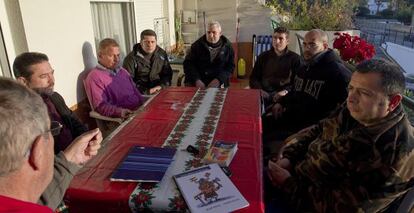Norway out: the Spaniards pinning job hopes on language lessons
A Norwegian on the Costa del Sol is giving classes to local job seekers


It all started with what seemed like a silly question. Sergio Sánchez, a 33-year-old truck driver, had just met Lasse Mejlænder, a Norwegian retiree who lives in San Pedro de Alcántara (Marbella). Sergio, an outgoing, friendly type, mentioned he’d been unemployed for the last seven months and that the outlook was bleak. It was then that the Norwegian man dropped the question: “Do you want to work in my country?”
And so it was that a 70-year-old man who was “bored” of living in retirement started teaching Norwegian to jobless Spaniards from several towns in Málaga and Cádiz province.
His students are bus drivers, movers and construction workers aged from 18 to 57, all men, all weary after months of inactivity; some have a wife, kids and a mortgage to pay. There is even one college graduate: Miguel Ángel Jiménez, 28, a primary school teacher from San Pedro who “unfortunately” has been unable to find a job in his line of work. “I’ve worked in supermarkets and a bingo hall,” he says.
Jiménez goes to Lasse’s classes, studies the language on his own (“it’s pretty tough, let’s not kid ourselves”) and acts as the teacher’s assistant, helping the rest of the group with their pronunciation and the difficulties of learning a new subject after years of not going to school.
“I’m very sad about what’s happening in Spain, there’s so many good people without a job...” says Lasse slowly in a thickly accented Spanish.
“My country is very rich. It is full of petroleum, gas and there’s a lot of salmon. It needs good workers. But they need to speak Norwegian.”
This improvised teacher began his new trade in October with a group made up of four men, the last of whom quit after four months. “The poor guy couldn’t keep up with the pace,” explains Sergio.
All of Lasse’s students agree he is a very strict instructor, and that he gets really angry if somebody is late. “He is very stubborn,” notes one student, Miguel Ángel.
“He’s just missing Hitler’s mustache,” jokes Sergio.
Two weeks ago, Sergio, Juan and José Antonio flew to Oslo. Lasse, who calls them “the boys,” found them work through his network of old contacts in the auto industry (he was also very active in supporting the fight against cancer and a whole set of other projects).
They’ll start working in March “driving concrete mixers to build a tunnel,” explains Sergio, who says the salary is 4,000 euros (minus around 1,000 in taxes) and that they also get free accommodation and a company car.
Two days after landing in the capital, they went to see the small village where they will be working. “It’s perfect,” says Sergio over the telephone. “Very pretty, pure forest land. What we’ve noticed is that the language thing is going to be tough. They cut their words in half and it’s a bit hard for us. We’re going to get extra courses at Cáritas. But we’re wild about starting to work again.”
At the airport, they were met by Hylde Kiel Paulsen, a 55-year-old pensioner who is friends with Lasse and is helping them with everything.
Hylde is well acquainted with Spain and explains her decision to help out thus: “I do it because I feel like it. They’re very nice and they’re friends of Lasse. Corruption has nearly ruined Spain, it’s awful. Businessmen pay politicians to do business — just look at Marbella. And who loses out now? The poor folks. The guy with a Mercedes isn’t going to give you a penny.”
From San Pedro, Lasse’s students follow with great interest any news from their compatriots who are already in Norway. Some of those who are most desperate to find work are beginning to feel impatient and even doubt the promises made by the retiree.
After “the boys” left, Lasse started teaching two new groups, one made up of 10 adults and another consisting of four young men aged between 18 and 20 with no work experience, whom he has asked to take a course in operating forklifts.
“Maybe a month from now they’ll have a job,” says Lasse, who claims to have a waiting list of 500 would-be students of Norwegian.
But his wife, who is from Ecuador, is getting tired of seeing her house transformed into an ad hoc language academy. “She has the character of a pit bull,” jokes Lasse, who is angry because the town of San Pedro has denied him a room for his classes.
He is also getting worried about the costs of his operation. He has asked his students for 60 euros a month (he explains that just photocopying each workbook, which took him four months to develop, costs 46 euros), but almost nobody has paid him.
He is also pondering how to cover the costs that his “shipments” of Spaniards are causing his Norwegian friends back home. He is considering asking them for a percentage of their first paycheck.
“I don’t know, but if I keep this up, I’m going to need help,” he says.
Tu suscripción se está usando en otro dispositivo
¿Quieres añadir otro usuario a tu suscripción?
Si continúas leyendo en este dispositivo, no se podrá leer en el otro.
FlechaTu suscripción se está usando en otro dispositivo y solo puedes acceder a EL PAÍS desde un dispositivo a la vez.
Si quieres compartir tu cuenta, cambia tu suscripción a la modalidad Premium, así podrás añadir otro usuario. Cada uno accederá con su propia cuenta de email, lo que os permitirá personalizar vuestra experiencia en EL PAÍS.
¿Tienes una suscripción de empresa? Accede aquí para contratar más cuentas.
En el caso de no saber quién está usando tu cuenta, te recomendamos cambiar tu contraseña aquí.
Si decides continuar compartiendo tu cuenta, este mensaje se mostrará en tu dispositivo y en el de la otra persona que está usando tu cuenta de forma indefinida, afectando a tu experiencia de lectura. Puedes consultar aquí los términos y condiciones de la suscripción digital.








































